
Date: 2021-07-22 Visitcount: 92
Global governance in education is a special phenomenon. It normally refers to various social stakeholders jointly participate in education development process through a variety of programs and activities for the solutions of common challenges. International organizations (IOs) such as UNESCO, WTO and the World Bank are pursuing profound and normative goals and have shown the ability to formulate the rules of world education which is shaping the future direction of national public education policies. As China education involved in the process of globalization of education and the continuous growth of the particular role, the focus of global governance will help the higher education institutions (HEIs) develop more relevant educational program to nurture global and responsible citizens and leaders towards future and translate their knowledge and creativity to benefit the local and global communities. To this end, Zhejiang University (ZJU) has launched Global Competency Center (GCC-ZJU), an interschools and departments Platform and intensive learning program open to all the students. Under the epidemic situation, teachers and students discussed online through ZOOM.
In the afternoon of July 18th, Professor Yue Kan, Deputy Dean of College of Education, hosted the opening ceremony of the summer program and explained in detail the program’s background, main objectives and relevant arrangements.
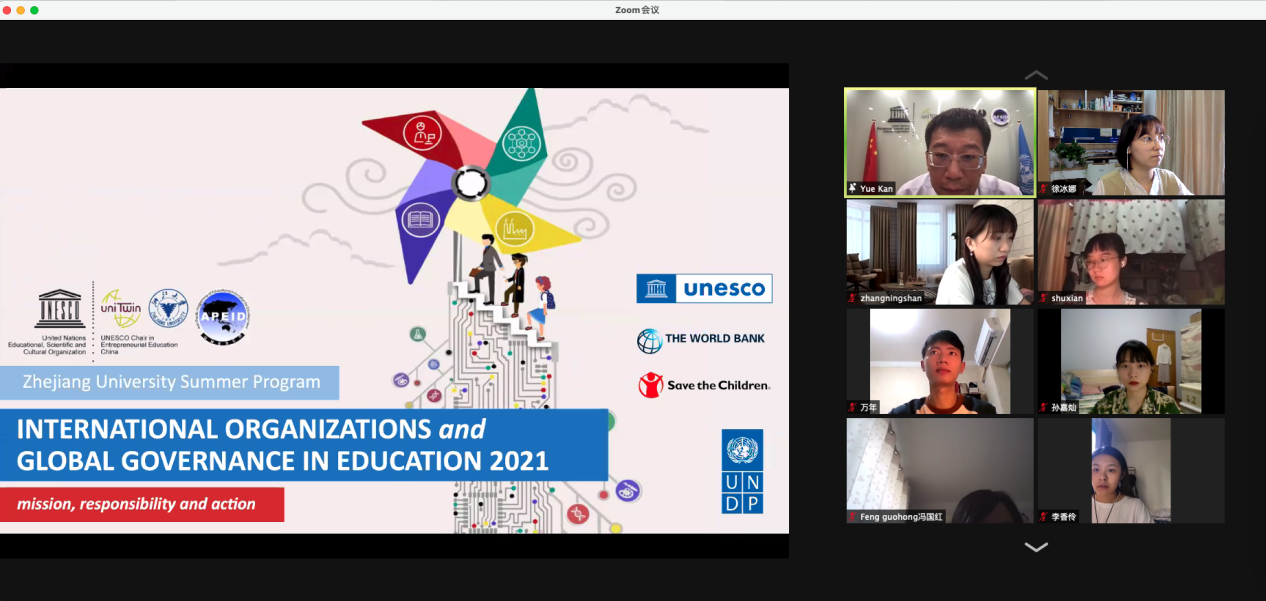
Mr. Robert Parua, education specialist in UNESCO Beijing Office, gave the first lecture. He mainly discussed about sustainable development from the perspective of global citizenship education, as global citizenship education and SDG4 are two inseparable topics. He believed that global citizenship education should not be perceived as an independent discipline, and gave his opinions on how to implement global citizenship education.
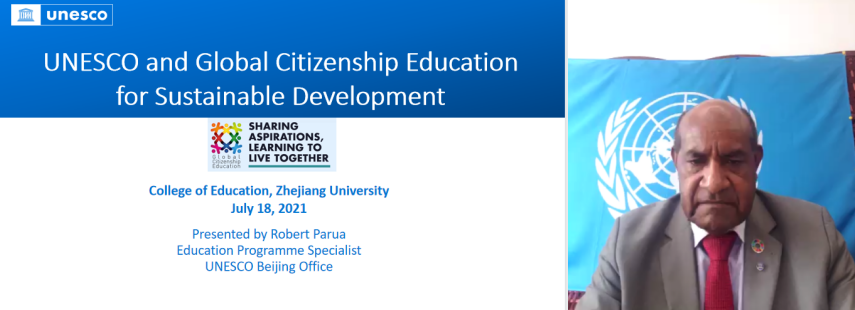
Next, Bingna Xu and Xin Weng, interns of Asian and Pacific Regional Bureau for Education, Bankok and UNESCO IITE, Moscow, shared their experience concerning internships in the UNESCO, giving the audience a new perspective on the understanding of IOs.

On the morning of July 19th, Dr. Xiaoyan Liang, the Lead Education Specialist of World Bank (Washington / Tanzania), introduced the structure and tasks of international education, in which the WB is an important international education aid institution. Leadership and priorities, norms and standards, knowledge, data and monitoring, accountability and financing are six important aspects of the current international education development work. WB regards education as an investment and prerequisite for poverty reduction, growth and competitiveness, and strives to ensure that quality education and lifelong learning are accessible to everyone. Dr. Liang also affirmed China's work in implementing compulsory education. After the lecture, Dr. Leina Shen and Dr. Ruichang Ding reviewed and commented the lecture in a dialogue.

Professor Libing Wang, Chief of Section of Educational Innovations and Skills Development, UNESCO Asia and Pacific Regional Bureau for Education (Bangkok), introduced the meaning of global education governance and the framework of UNESCO. There are mainly five main functions of UNESCO, namely, laboratory of ideas, standard-setter, clearing house, capacity-builder, catalyst for international cooperation. Professor Wang encouraged everyone to make good use of the existing resources and opportunities and try to work in IOs. Professor Jun Teng from Beijing Normal University had an interactive dialogue with professor Wang after the lecture.

Tianyi Liu, a junior professional officer (JPO) from UNESCO headquarters (Paris, France) introduced how to enter IOs and explained in detail the planning and application process of IOs.

On the afternoon of July 20th, Ms. Ruoxiao Song, Youth Empowerment Alliance Coordinator from UNDP Regional Bureau for Asia and the Pacific (Bangkok), introduced the development of UNDP. In addition, Ms. Song introduced her daily tasks to show the participation and role of the young in the contemporary context of educational global governance, demonstrating that youth development is a major characteristic of SDGs. At the same time, she also talked about her experience on the application of job in IOs.

Professor Fengchun Miao, Chief of the Unit for Technology and Artificial Intelligence in Education in UNESCO Headquarters (Paris), gave a lecture concerning educational global governance and AI. He put forward basic concept of international governance and some deficiencies in the process of international educational governance in China. Then, Dr. Miao explained UNESCO's efforts to improve educational governance by using science and technology in combination with relevant policies and strategic plans. Dr. Xuesong Zhai from Zhejiang University commented on the lecture and had a fruitful dialogue with Professor Miao.

Next, Ms. Mo Wang, project specialist from the UNESCO Institute for Lifelong Learning (UIL), shared her career development and experiences at UIL. As the only Chinese staff member, Ms. Wang stressed the importance of presenting your abilities in the workplace and building up trust with officials from different countries in the workplace. She then detailed about UIL's three-year core program, which examined the role of universities in promoting lifelong learning. Through initiatives such as modifying parts of the curriculum, changing teaching methods and opening up further to the community, universities could promote engagement of citizens so that more people could benefit from institutional resources.
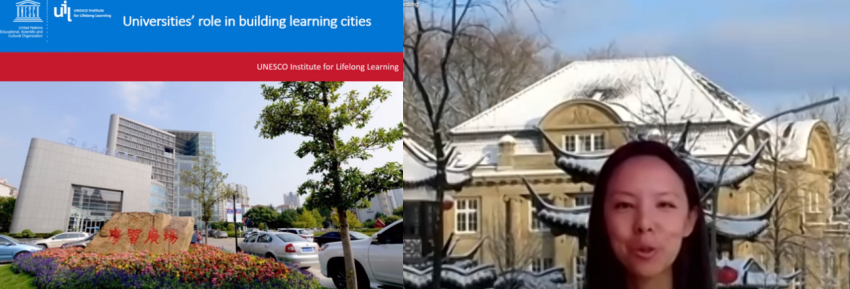
On July 21th, Ms. Yiling Kong, associate project officer at the section for higher education, UNESCO Headquarters (Paris), gave a detailed briefing on the CFIT Phase III project and the details of the project management. The CFIT Phase III project - Higher Technical Education in Africa for a Technical and Innovative Workforce project – could be understood from three perspectives: why the project is being carried out, what the project aims to achieve and how to achieve these goals. Students benefited a lot from Ms. Kong’s sharing concerning trust fund management.

On July 21th, Ms. Yuanyue Gao, intern at FAO China, gave a presentation on her application and internship experience. She worked in the Innovation Project Team and was involved in the Sustainable Development Goals Model Village Project, which promotes agricultural economic development through Internet + Agriculture + Finance. She shared with the audience three insights from her internship: firstly, there are no clear boundaries between the different internship positions; secondly, you have to be rigorous and careful in your work and pay attention to details; thirdly, you have to be proactive and creative. Afterwards, Ms. Gao also shared her extremely interview experience, in which she advised students to prepare a good self-introduction, a statement on why they chose the position, reasons why they are qualified for the job and their career plan when they attend an interview with an IO.

Ms. Hui Huang, shared her experiences as an intern at the UNESCO Institute for Lifelong Learning (UIL). She offered three thoughts and suggestions on applying for internships in IOs. Firstly, we need to clarify the purpose and expectations of our internship, understand the relevant IOs, prepare a corresponding CV and career plan, and be clear about our research interests. Secondly, we need to prepare well by reading policy documents, reports, conference proceedings and research papers on programs and projects relevant to the position we are applying for, and refine our logistical skills such as using office software, following up on project emails, and research skills such as literature reviews and case studies. Thirdly, we need to participate in global governance whole-heartedly, develop our critical thinking and make good use of the internship to tell the Chinese story and spread the Chinese voice.

On July 22th, Mr. Yuchi Zhao from Beijing Normal University brought a special report on Gender Equality in Education and Achieving Gender Equality through Education. The report could be divided into four parts: the first part is UNESCO and gender equality; the second part is gender equality in education and the realization of gender equality through education; the third part is Gender Flagship: Coping with Covid-19; the fourth part is UNESCO Prize for Girls and Women's Education. Professor Zhao believed that gender equality is an important issue in global education governance, and called on more people to pay attention to and participate in activities in gender equality.
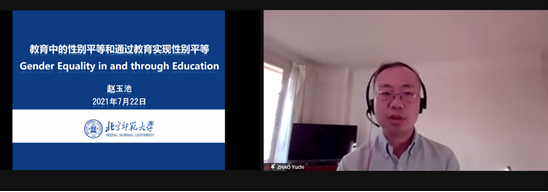
Ms. Xin Gao, Youth Development Specialist, UNDP China (Beijing), shared her experience working in IOs, including challenges and coping strategies encountered in work. She also analyzed in detail the characteristics and skills needed in IOs, like a pertinent professional background, language proficiency and communication skills, enthusiasm, problem solving ability and international perspective. At last she shared some channels of applying for work in the United Nations.

Ms. Li Wang, Consultant at CO Bangkok, described her internship and employment experience, and carefully shared the abilities needed for United Nations and some suggestions for the interviews. She encouraged students to jump out of the comfort zone, respect cultural diversity, consolidate professional knowledge, and maintain the mentality of lifelong learning. She referred to career matching as matching the best position according to one's desired research direction. If not, one can temporarily settle for the next best position and choose the same position in education, science or culture.
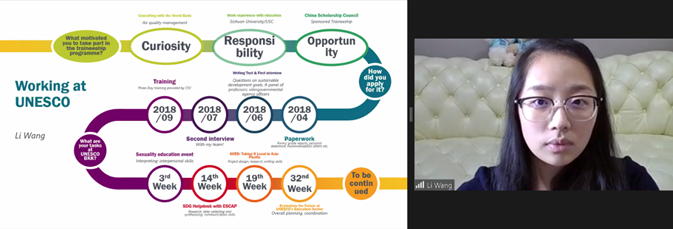
On July 23th, Dr. Hongwei Meng, an independent education expert, gave a report concerning IOs and educational global governance. At the beginning, Dr. Meng pointed out that at present, China lacks talents who participate in UNESCO professional activities, especially in projects. Then he introduced how to apply for international projects based on his own experience. He stressed that in the writing of international documents, we should pay great attention to the logic of writing and the details of the project. Finally, Dr. Meng also shared with the campers how to write your resume and encouraged everyone to actively participate in the project work of IOs in order to accumulate work experience in IOs.
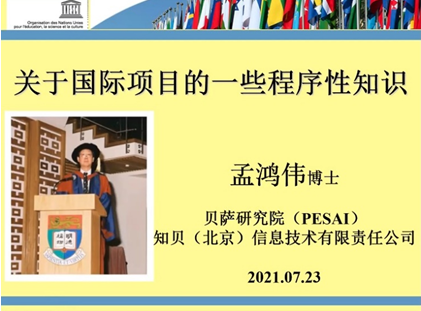
Dr. Roger Chao Jr., former Consultant for UNESCO Bangkok Office and program specialist at UNESCO International Center for Higher Education Innovation (IHECI) (Shenzhen), gave a report from a completely different perspective. Dr. Roger Chao Jr. first introduced the capacity framework of UNESCO and his UNESCO working experience. Then he introduced the problems that should be paid attention to as a UNESCO consultant and the role a consultant played. Dr. Roger Chao Jr. focused on the abilities required as a consultant, especially the construction of core competencies.
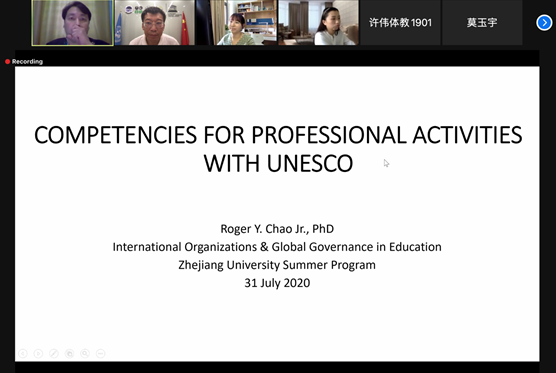
Arne Carlsen, former director of UNESCO Institute for Lifelong Learning (UIL) (Hamburg)introduced the concept of lifelong learning to the campers. He first introduced the content of lifelong learning with SGDs, SDG4 in particular. Then he elaborated with the OECD project. In the 21th century, transversal skills are of essential importance. The conceptual understanding of transversal skills varies, but they normally include skills such as critical thinking, innovation and entrepreneurship, global citizenship, self-control, adaptability, perseverance, and leadership. Not only education systems but also family, community, and workplace are all possible locations for the cultivation of transversal skills. It could be integrated in all curriculum at all levels in formal, nonformal and informal learning settings.
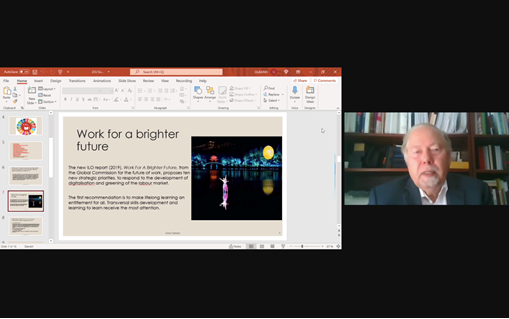
The six-day summer program came to an end successfully on July 23th. Through the detailed sharing of IO employee, interns and relevant experts, the students have a new understanding of the functions and missions of IOs and a new perspective for observing and analyzing the operation mechanism of them. More importantly, the experience of participating in IOs projects shared by many peers provided a possible prospect for the students' career planning. Students had an in-depth reflection on how China plays a responsible role in the global education governance in IOs, and were all stimulated to tell China’s stories and provide resolutions based on Chinese experience in the international community.
By WAN Nian

